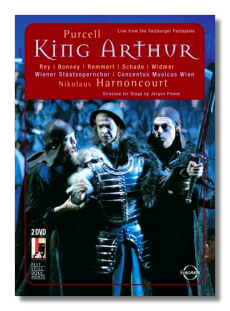
The Internet's Premier Classical Music Source
Related Links
- Purcell Reviews
- Latest Reviews
- More Reviews
-
By Composer
-
Collections
DVD & Blu-ray
Books
Concert Reviews
Articles/Interviews
Software
Audio
Search Amazon
Recommended Links
Site News
 DVD Review
DVD Review
Henry Purcell

King Arthur
or The British Worthy, Z 628
- Isabel Rey & Barbara Bonney, sopranos
- Birgit Remmert, alto
- Michael Schade, tenor
- Oliver Widmer, baritone
Konzertvereinigung Wiener Staatsopernchor
Concentus Musicus Wien/Nikolaus Harnoncourt
EuroArts DVD 2054508 2DVDs: 74 & 95min
Henry Purcell and librettist John Dryden never dreamed of a production of King Arthur like this one, where Merlin descends to the stage via a sailboard, and where Arthur and his rival, the Saxon King Oswald, fight a boxing match ("Round One! Box!") for a unified England and for the love of Emmeline. The work's extensive spoken passages – longer than those which are sung – are performed in German by actors, while the vocal music is performed in the original English by singers. The libretto, in addition to being lengthened, has been updated and now contains references to video cameras, the Bayreuth Festival, Karlheinz Stockhausen, and to Maestro Harnoncourt himself. He and the Concentus Musicus Wien occupy a pit right in the middle of stage, and characters onstage frequently interact with them. For the first ten minutes, I found these shenanigans confusing and alienating, but once I got into the mindset of this production, I enjoyed myself greatly. (It wouldn't hurt to do your homework before watching this DVD for the first time, if you don't already know this opera.) Stage director Jürgen Flimm, while hardly adhering to the letter of the original production in 1691, attempts to recapture its "little bit of this, little bit of that" spirit through cutting-edge stagecraft, topicality, and commedia dell'arte -style irreverence and slapstick. The result is often funny, sometimes touching, and always engrossing.
There is no definitive performing edition of this "dramatick opera." It is not always clear in which order the musical numbers are to be performed, what instruments are to accompany the songs and choruses, who sings what, and how much of Dryden's libretto was used in 1691. Harnoncourt's version omits a few numbers and gives the rollicking tenor song "Your hay it is mow'd" a rock beat! By blurring the period in which the action occurs, Flimm and Harnoncourt makes King Arthur more timeless and more quintessentially British.
The cast of singers and actors is a large one. Hearing Barbara Bonney sing "Fairest isle," the opera's penultimate number, will make you thank God for giving you ears. Once he warms up, the other standout singer is tenor Michael Schade, who also copes well with his unflattering costuming. (He also makes a game boxing referee!) Oliver Widmer sings well, but it looks like he is lip-syncing much of the time – which he may be! The actors are superb. Michael Maertens turns Arthur into a likeable British twit, and as Emmeline, Sylvie Rohrer is both girlish and elegant, and the scene in which she regains her sight through the agency of the Ariel-like sylph Philidel (cutely interpreted by Alexandra Henkel) is touching. Philidel's evil counterpart, Grimbald, is played with a croaking voice by Werner Wölbern, who might have wandered in from Monty Python and the Holy Grail. Harnoncourt's conducting is anything but devout; he has referred to King Arthur as "the first musical." Hearing this performance and then the John Eliot Gardiner recording on Erato, one might be fooled into thinking that one is hearing two completely different works. Needless to say, this production will displease purists, but it could make many new friends for Purcell's beautiful and varied score.
This production comes from the Salzburg Festspiele in July 2004 – specifically, from the Felsenreitschule, whose arcades are effectively used as part of the opera's action. The audience seems a little unsure about what to make of Flimm's spectacle, but God forbid an evening in the theater should make one think, right? The videography (16:9 format) is outstanding; one seems to be on the stage with the performers much of the time. The sound is also among the best I've heard on a DVD. This is most heartily recommended.
Copyright © 2005, Raymond Tuttle




















